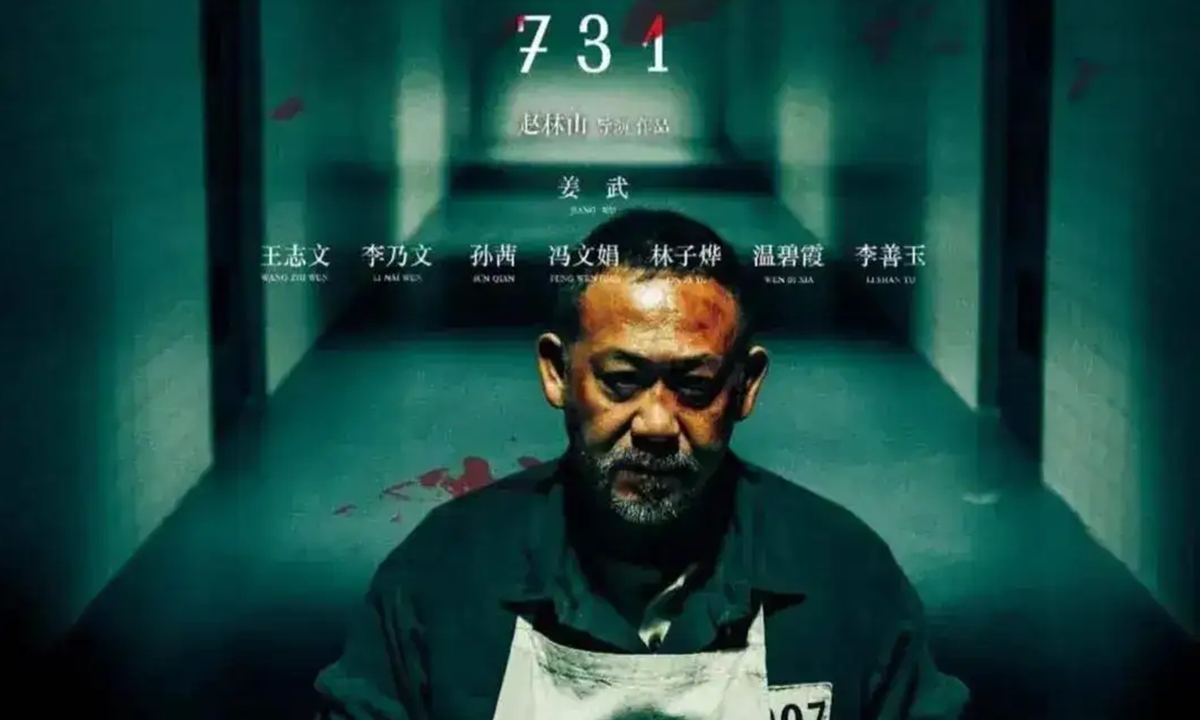
Promotional material of Biochemical Revelations 731 Photo: Snapshot of Sina Weibo
Chinese film
Biochemical Revelations 731, which delves into the horrific bacteriological experiments conducted by the Japanese army's Kwantung Army Chemical Department, also known as Unit 731, in Northeast China, is said to premiere on July 31 in the Chinese mainland. However, as of Tuesday, no information about the film's release has been found on major Chinese film platforms like Maoyan or Taopiaopiao.
Film experts noted that regardless of when it is released, the film is poised to be another significant medium for exposing the vile acts of Unit 731. The film's potential impact and educational value should not be overlooked. As a medium of communication, Biochemical Revolutions 731 is expected to be an important tool in revealing the actions of Unit 731.
Media has reported that the film has been meticulously researched and filmed over a decade with the aim of revealing the atrocities committed by the Japanese military through the lens of a small character's life, emphasizing the preciousness of peace and urging viewers to learn from history.
The film has garnered significant attention since the early stages of production, stirring discussions on patriotism and historical reflection. However, the film has encountered unexpected controversy on Chinese social media in recent days. Some netizens claiming to be parents have lodged complaints, saying that the film's graphic content is excessively "bloody" and that they fear the terrifying scenes of experimentation could traumatize their children, even suggesting that the film should be "reported and banned from release."
Nevertheless, these concerns were quickly overshadowed by a stronger public sentiment. Many netizens have passionately demanded the film's release, stating, "We want to see the truth of the past! This is real history that happened in our country and deserve to be known by more people." Some even recalled watching the Man Behind the Sun, a Hong Kong historical exploitation horror film released in 1988, expressing that their feelings after the film were not of fear but of hatred.
A netizen surnamed Chen told the Global Times on Tuesday that he learned about this history from the Japanese mystery novelist Seiichi Morimura's non-fiction work The Devil's Gluttony, which exposed the crimes of Unit 731. "This history must be passed on to the next generation," he said.
Others have likened the film to the US film Oppenheimer and hope it will be shown in Japan to educate more Japanese people about this history. The film's potential to serve as a mirror reflecting the past is undeniable.
Early in 2024, Harbin in Northeast China's Heilongjiang Province became a popular tourist destination, not only for its renowned "Ice and Snow World" attraction but also for the Exhibition Hall of Evidences of Crime Committed by Unit 731 of the Japanese Imperial Army. The exhibition attracted a large number of visitors who braved the cold to line up.
Some noted that the highly visited exhibition hall in Harbin shows Chinese people's eagerness to know more about this history.
Liu Hui, dean of the school of drama and film at Shenzhen University, told the Global Times on Tuesday that war-themed movies like
Biochemical Revelations 731 has the universal value of criticizing war and call for peace. From various online controversies, it can be seen that this subject matter is sensitive. Therefore, films of this subject should be supported by a strong academic team. Only then can it improve marketing and the possibility of winning awards.
"The greatest value of such films lies in raising controversial topics, attracting social attention, and letting the world better understand China's stance. There is an urgent need for an international perspective and narrative habits to have greater impact," he said.




